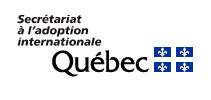Psychosocial Assessment of the Adopter
Just as Québec counts on the country of origin to draw an exact and fair profile of a child who is proposed for adoption, the country of origin expects the adopter to be carefully assessed in Québec. That assessment is essential in order to have the best possible matches and to ensure children's well-being.
The psychosocial assessment must focus on the adopter’s capacity to integrate the child into his or her new environment and to meet his or her physical, psychological and social needs.
The psychosocial assessment is done by a member of one of the following orders:
- Ordre des psychologues du Québec

- Ordre des travailleurs sociaux et des thérapeutes conjugaux et familiaux du Québec (available in French only)

The assessment is based on criteria agreed between the two professional orders, the directors of youth protection and the Minister of Health and Social Services.
It may be necessary for the Director of Youth Protection (DYP) to supervise the assessment, depending on the requirements of the law or the foreign authorities. In this case, the adopter must contact the centre intégré de santé et de services sociaux or the centre intégré universitaire de santé et de services sociaux in his or her region ![]() for an assessment.
for an assessment.
The evaluator's responsibilities
The evaluator's main responsibility is to conduct a psychosocial assessment of the adopter, but also raise the adopter's awareness of the challenges of international adoption and parenthood through adoption.
The evaluator must obtain the adopter's medical certificate and take cognizance of it in order to prepare the report and to adjust, if applicable, his or her recommendations.
The evaluator may also request any assessment or other document deemed relevant, with the consent of the Director of Youth Protection.
Challenges to address
Assessing without knowing the child to be adopted
The evaluator must issue a recommendation on an adopter's parenting capacity and ability to meet the needs of a child who has not yet been identified.
Thus, the evaluator must determine the adopter's capacities and limits in caring for a child with a certain profile, or, if applicable, in receiving siblings. The evaluator must also consider the various physical and emotional needs that a child may have, in particular those related to his or her age and health condition.
Writing to be understood by all
In light of numerous cultural variables, an adoption plan may be viewed differently by adopters, intervening parties in the country of origin and the psychosocial evaluator.
In this context, preparing a psychosocial assessment report is a very delicate exercise, as it must reflect the cross-cultural context of the adoption. Translation of the report, when required, adds to the difficulty.
In the event that the adoption plan changes
Throughout the assessment process, the evaluator must notify the Director of Youth Protection or the Secrétariat à l’adoption internationale, as applicable, of any change to the adopter's initial adoption plan.
Submitting the assessment report and period of validity
For the process to be as efficient as possible, the evaluator must submit the report to the appropriate Director of Youth Protection within two months of the initial meeting with the adopter.
In some cases, depending on the requirements of the country of origin, the adopter may have to submit additional assessments, whether medical or psychological.
In Québec, the psychosocial assessment for an adoption proposal is valid for two years. After that time, an updated assessment is necessary.
Updated psychosocial assessment
An updated psychosocial assessment reports on changes in the family unit and maintains an accurate and up-to-date picture of the adopters, both for the country of origin and for the appropriate Québec authorities.
Other reasons may justify an update or even a reassessment of the plan, in particular when an event changes the previously observed dynamics of the couple or the family, such as:
- a death
- a separation
- a pregnancy
- the placement of a child
- a move
- a physical or mental illness
- a bankruptcy
An update may also be necessary when the country of origin requires additional information or when the country's rules regarding validity require it.
Waiting period for a psychosocial assessment for a second child
A psychosocial assessment with a view to adoption cannot begin until 12 months have elapsed since the arrival of a biological child, an adopted child or a foster child.
The waiting period between a child's arrival and the adopter's psychosocial assessment for the adoption of another child is based on the time periods for adoption.
